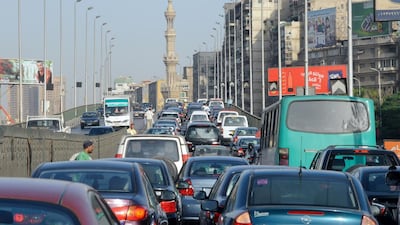Not long before the popular uprising in Egypt in 2011, my lawyer dragged me to a dreary office near Cairo’s Ataba Square to sign a piece of paper for a real estate transaction I was making.
The offices in the poorly constructed, badly lit and crowded concrete building did not have enough desks to seat every employee. The power was cut that day, and the employees were sitting in semi-gloom.
They sat me down on the only free chair, next to a man in his mid-twenties who was transferring data by hand into a giant ledger book, sheet by sheet from a stack of government papers covered with signatures and stamps.
We began chatting. He told me he worked in a government office for financial security, but had another job in the private sector.
What did he do? He was a computer programmer.
“Then why on earth are you doing this by hand? Why don’t you computerise the process?”
“The government moves slowly,” was his reply.
Indeed.
Egypt wastes vast resources employing an army to perform menial tasks that could be done instantaneously by a computer. Tens of thousands of people are forced to wait in queues every day for procedures done easily online. Their vehicles add to Egypt’s traffic gridlock as they travel to collect stamps and signatures from government offices.
This is not to mention the inevitable wad of cash that must be turned over in exchange for these stamps and signatures.
Egypt does not lack the technical savvy to put government procedures online. Arabian Gulf countries are full of Egyptian techies who help governments go digital. The governments of other countries such as India, Thailand, Malaysia and Indonesia have been developing systems that could be put in place in Egypt, and they could be consulted. Many software packages can now pretty much be bought off the shelf.
“We have all it takes to do it. Will we put it on the national agenda? Today it’s not on it,” says Wael Amin, the chairman of Itworx, a software services provider in Cairo.
Still, he points to two bright spots.
The government about a decade ago successfully computerised the placement of students enrolling in university, previously an impossibly complicated and messy process when done manually.
The other positive is the family card, a smart card the government uses to distribute a number of subsidised goods and services such as sugar, bread and health care. Five years ago the government had been distributing goods manually using a green booklet.
Beyond this, not much else has been done.
The government, before it can put its procedures on computers on a wide scale, needs to put three building blocks in place: electronic identification, electronic payments and electronic signatures.
That’s according to Mr Amin, who has been working on government computer contracts in Egypt and the Arabian Gulf for two decades.
Legislation to make e-identification possible is being enacted, e-payment is accepted for only a few government services, and almost nothing has been done on e-signatures.
Once these are up and running, a number of systems that would make life much simpler for citizens could easily be put in place.
One area ripe for digitalisation is the notary office, which is responsible for registering real estate and for granting powers of attorney. Now it is all done manually: to dig out a record, employees must go through vast paper files organised according to the date the procedure was registered. The queues, chaos and chances for error in these offices are beyond horrendous.
Another area is in the government health system. Presently, you must bring your own files and information every time you visit a doctor or hospital, an inefficient system that leads to all sorts of omissions and duplication.
There are other obstacles to be overcome, however, before such systems can be put in place.
One is Egyptian law. Some laws, written up as far back as a century ago, are very precise on the way that government employees must interact with the public. Not much space is provided for electronic services. The problem with changing these laws is that there is a long backlog of other changes that people want made to them, and once you open them up for amendment you open up a can of worms.
Another is government employees who resist change. Employees, especially the older ones, are not trained in technology. Not only will they be stripped of the prestige of deciding the fate of petitioners, but also of their ability to solicit bribes.
The government should expend political capital to get digitalisation moving. A starting point may be to put in place e-transaction services between government departments, then roll them out to the general public once civil servants gain an understanding.
Later on, various government departments could come together to provide even more innovative systems. For example, the parents of newborn children need to register them at three ministries: the civil status organisation at the interior ministry, the health ministry and the education ministry. These could all be combined in one step.
In Dubai, you get an instantaneous notification on your mobile that you have been fined for a traffic violation, then given the option of paying the fine on the spot. This makes it less likely that you will run a red light in future. For Egypt, this would require connecting the computer systems of the finance ministry, interior ministry and telecoms operator. As the rest of the world speeds ahead, no one will penalise the Egyptian government if it presses its foot a little harder on the pedal.
Patrick Werr has worked as a financial writer in Egypt for 25 years.

